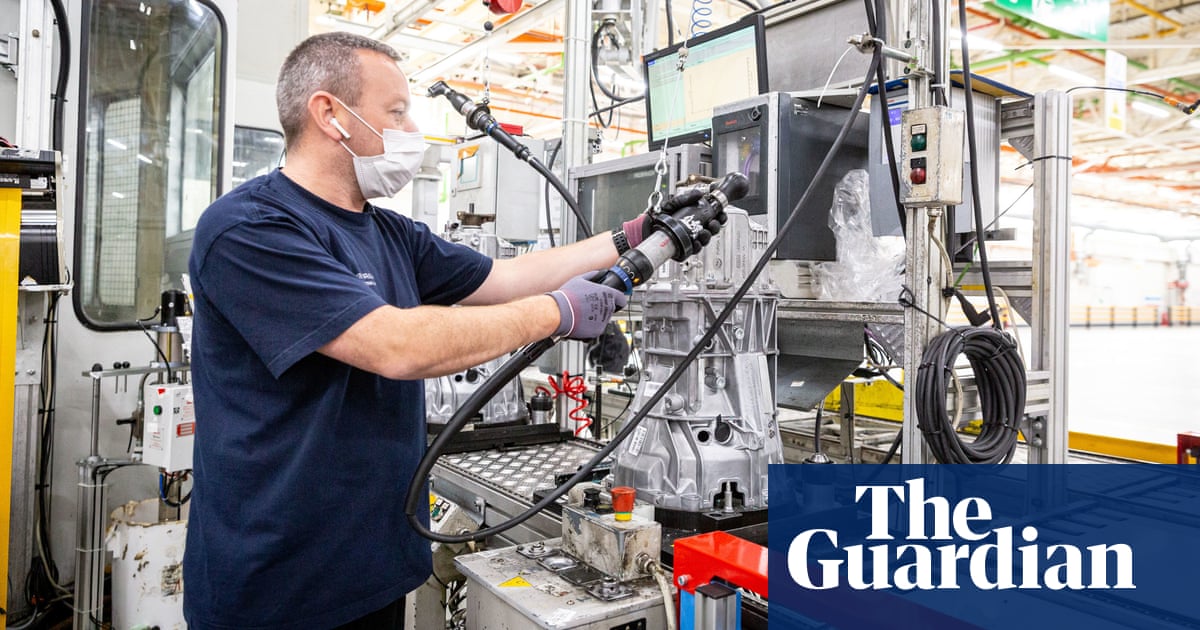Ford cuts 4,000 jobs in Europe, including 800 in UK, after slowdown in EV sales

Ford has said it will cut 4,000 jobs in Europe, becoming the latest carmaker to try to reduce costs amid slowing growth in electric car sales and competition from China.
The American carmaker said on Wednesday it would axe 800 jobs in the UK and 2,900 in Germany. The company’s UK sites in Dagenham and Halewood will not be affected.
The cuts represent about 14% of Ford’s 28,000 workforce in Europe and will be completed by the end of 2027.
Ford is the latest in a series of global carmakers to aim for cost savings as the industry struggles with waning demand while also trying to invest in the transition to electric cars.
The company also cut back planned production of the new electric Explorer and Capri models, citing the “weak economic situation and lower-than-expected demand for electric cars”. Ford’s factory in Cologne, Germany, will reduce its hours of production after the company spent $2bn (£1.6bn) upgrading it to make battery cars.
Several carmakers have this year said they plan to sell more hybrid cars, which combine an internal combustion engine with a smaller battery. They include Ford’s US operations, which cancelled an electric SUV in August, Japan’s Toyota, Sweden’s Volvo and the Bentley in the UK.
Ford said Europe’s carmakers “face significant competitive and economic headwinds while also tackling a misalignment between CO2 regulations and consumer demand for electrified vehicles”.
The cuts will affect product development in Europe, as well as administrative areas such as finance, human resources and government affairs.
Ford did not specify where the British job cuts would fall. It employs about 6,500 people in the UK, including at a technical centre in Dunton, Essex, where it develops the Transit van.
As the UK car industry prepared to meet British ministers on Wednesday, Peter Godsell, a vice-president of Ford in Europe, also called for a relaxation of rules on the UK’s zero-emission vehicle (ZEV) mandate. Under the mandate, carmakers must sell an increasing proportion of electric cars each year.
“The UK ZEV mandate is challenging,” Godsell said. “The market conditions are making it unworkable at the moment. It’s a really unstable environment.”
Manufacturers have been increasingly open with criticisms of the rules, although charger companies and fleet owners argue that changing the rules would imperil billions of pounds of investments.
John Lawler, Ford’s chief financial officer, said carmakers needed government help to improve market conditions across Europe.
after newsletter promotion
“What we lack in Europe and Germany is an unmistakable, clear policy agenda to advance e-mobility, such as public investments in charging infrastructure, meaningful incentives to help consumers make the shift to electrified vehicles, improving cost competitiveness for manufacturers, and greater flexibility in meeting CO2 compliance targets,” he said.
Globally, the cuts to its European workforce will affect 2.3% of the company’s 174,000 employees worldwide.
The business axed about 1,300 UK jobs as part of a wider programme of 3,800 job cuts across Europe early last year. Those redundancies in its internal combustion operations were blamed on rising costs and the need to speed up the switch from petrol and diesel engines to electric vehicles.
A UK government spokesperson said: “We know this will be a concerning time for workers at Ford UK and their families. While this is a Europe-wide decision taken for commercial reasons, we have asked the company to urgently share its full plans so we can help mitigate the impact in the UK.
“We have a longstanding partnership with Ford and will continue to work closely with them on their manufacturing future in the UK.”
Related
Zelenskyy reiterates call for air truce after huge Russian attack…
We need Russia to stop attacks, Zelenskyy says, backing calls for truce in air, at seaUkrainian president Volodymyr Zelenskyy has responded to overnight attacks
Europe scrambles to rearm as Trump threatens security guarantees and…
CNN — European leaders have vowed to rearm the continent at historic emergency talks h
Russia launches ‘massive’ attack on Ukraine after Europe rushes to…
Ukraine's energy and gas infrastructure came "under massive missile and drone shelling" by Russia on Friday, a Ukrainian minister said."The energy and gas infra
American severance may be averted, but Europe’s leaders must fear…
With a mixture of regret, laced with incredulity, European leaders gathered in Brussels to marshal their forces for a power struggle not with Russia, but with t












